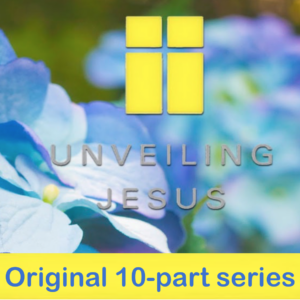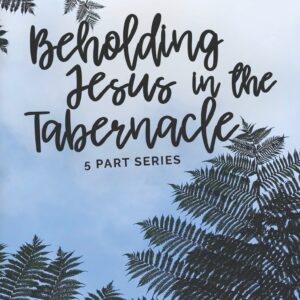All the Promises of God are YES is Jesus!
Description: In this first session of “Promises of God,” Tricia Gunn lays the groundwork for the series by expounding on the following topics: 1. What is a promise? By definition, a promise is something spoken or written. And it’s good. It’s a blessing! And it’s something that will happen in the future. It hasn’t happened yet, but it will! It’s something to look forward to and eagerly expect! 2. Who is God? If we’re going to talk about the promises of God, we need to know who it is that is making promises to us. God is good and only good and only has good to give! 3. How can we know the promises of God are for us? We can know for sure that all of the promise of God are YES in Jesus when we understand the Simple gospel
Transcript of the teaching:
Plan for this session and the next
Lay groundwork before getting into specific promises of God.
1. What is a promise? Definition of a promise.
2. Who is God? If we’re going to talk about the promises of God, we need to know who it is that is making promises to us.
3. How can we know the promises of God are for us? We can know when we understand the Simple gospel
4. How do we receive a promise from God? Hope, faith, prayer, the name of Jesus, agreement, waiting, time
1. What is a promise?
Here is the definition of “promise” from a couple of dictionaries:
Webster – a declaration that one will do or refrain from doing something specified; a legally binding declaration that gives the person to whom it is made a right to expect or to claim the performance or forbearance of a specified act
Brittanica – a statement telling someone that you will definitely do something or that something will definitely happen in the future
The Greek word for promise used in the New Testament: epangelia. From Thayers Greek dictionary: announcement; the act of promising, a promise given or to be given; a promised good or blessing
By definition, a promise is something spoken or written; it’s words. And it’s good. It’s a blessing. And it’s something that will happen in the future. It hasn’t happened yet, but it will! It’s something to look forward to and eagerly expect!
And in the coming weeks we will learn about how in reality God’s promises have already happened in heaven. It is finished! And faith is simply receiving what God has already been provided through His grace. Everything we have ever needed or will ever need has already provided through Jesus Christ in His finished work at the cross and in His resurrection.
2 Corinthians 1:19-20, NIV – For the Son of God, Jesus Christ, who was preached among you by us—by me and Silas and Timothy—was not “Yes” and “No,” but in him it has always been “Yes.” 20 For no matter how many promises God has made, they are “Yes” in Christ. And so through him the “Amen” is spoken by us to the glory of God.
That passage in The Living Bible:
2 Corinthians 1:19-20, TLB – …I have been telling you about Jesus Christ the Son of God. He isn’t one to say yes when he means no. He always does exactly what he says. 20 He carries out and fulfills all of God’s promises, no matter how many of them there are; and we have told everyone how faithful he is, giving glory to his name.
When you say “Amen,” you are saying, “God, You are faithful to Your word.” So all of God’s promises are fulfilled in Jesus. In fact, Jesus is the YES from God. He is our all in all. We’ll talk about that a bit more in a minute.
Epangelia is the Greek word for “promise” in the New Testament, but I found that as studied the Hebrew words in the Old Testament that are sometimes translated “promise,” it’s often the Hebrew word dāḇar – which means to speak, declare, command, promise. It’s sometimes translated “covenant” or just simply the word “word.”
Joshua 23:14, The Message – Know this with all your heart, with everything in you, that not one detail has failed of all the good things God, your God, promised you. It has all happened. Nothing’s left undone—not so much as a word.
So when God speaks, it’s a promise. If He says it, it’s faithful and true because that’s who He is.
Revelation 19:11, NASB – And I saw heaven opened, and behold, a white horse, and He who sat on it is called Faithful and True…
2. Who is God?
So who is making the promises? God. Who is God? God is love. His identity is love. He is love and we are His beloved. Nothing He says or does towards us would contradict that.
1 John 4:16 – And we have known and believed the love that God has for us. God is love, and he who abides in love abides in God, and God in him.
God is good because God is love. He is good to the core, only good, and only has good to give, period.
James 1:17 – Every good gift and every perfect gift is from above, and comes down from the Father of lights, with whom there is no variation or shadow of turning.
Can’t contextualize God
Years ago I had what I call a “grace awakening.” It was really an awakening to Jesus and His finished work. When I realized the work was finished, and I am redeemed, cleansed, forgiven, and righteous because of what Jesus accomplished for me, I could finally rest! No more striving to get God to accept me, love me, and approve of me. In a flash of light, I saw what I could never unsee: Jesus knew me, Jesus loved me, Jesus came as me, died as me, rose as me so I could be as He is – in perfect union with God.
With that awakening came a realization that I was reading the Bible all wrong. I was mixing the Old Covenant with the New Covenant and taking scriptures out of context. And it was confusing and discouraging! Often it wasn’t good news. For instance, I would read about the curse of the law, and I thought it applied to me. But then all of a sudden I realized I’m not under the law, so I’m not under the curse of the law!
Romans 10:4 – Christ is the end of the law for righteousness to everyone who believes.
Galatians 3:13 – Christ has redeemed us from the curse of the law, having become a curse for us (for it is written, “Cursed is everyone who hangs on a tree”)…
While we need to be careful to read scripture in context, did you know there is much of the text of the Bible that is impossible to take out of context, whether it be from Genesis, Exodus, Psalms, Joel, John, Romans, or Revelation? What parts of the Bible am I referring to? The parts about the nature of God, His promises, His will, His plans, His power, His grace, His mercy, and His love. No matter where you look, God never changes. He’s the same. And He’s simply GOOD.
Malachi 3:6 – God said, “For I am the Lord, I do not change.”
Numbers 23:19 – God is not human, that he should lie, not a human being, that he should change his mind. Does he speak and then not act? Does he promise and not fulfill?
Hebrews 13:8 – Jesus Christ is the same yesterday, today, and forever.
There are many more scriptures like these. Man changes, but God never does. Since God never changes, you can’t contextualize Him. He transcends time and space. He’s the Great I AM who was and is and is to come. The Alpha and Omega, the Beginning and the End.
Psalm 106:1 – Praise the Lord! Oh, give thanks to the Lord, for He is good! For His mercy endures forever.
God reveals His mercy in His goodness towards us. He never gives us what our sins deserve. He lavishes us with the SUPER-abundance of His grace.
Psalm 145:9, The Message – God is good to one and all; everything he does is soaked through with grace.
The goodness of God is so powerful, it will soften the hardest heart, open the blindest of eyes, and change the most deceived minds.
Romans 2:4 – …the goodness of God leads you to repentance…[metanoia – a change of mind]
Psalm 119:66, The Message – Before I learned to answer you, I wandered all over the place, but now I’m in step with your Word. You are good, and the source of good; train me in your goodness.
This is what I pray for people who are blind – Lord, chase them down with Your goodness and mercy! Ambush them!
Psalm 23:6 – Surely goodness and mercy shall follow me all the days of my life…
Goodness in Hebrew – ṭôḇ – good in the widest sense; benefit; welfare, prosperity, happiness; good things; bounty; beautiful, best, better, cheerful, at ease, fair, (be in) favour, fine, glad, graciously, joyful, kindly, kindness, loving, merry, most, pleasant, pleasing, pleasure, precious, sweet, wealth.
All good!
Mercy in Hebrew – ḥeseḏ – goodness, kindness, faithfulness; favour, good deed, merciful, pity; grace; doing favours and benefits; kindly instruction; kindness (especially as extended to the lowly, needy and miserable); lovingkindness in condescending to the needs of his creatures; lovingkindness in redemption from enemies and troubles; lovingkindness in preservation of life from death; lovingkindness in quickening of spiritual life; lovingkindness in redemption from sin; abundant, plenteous in kindness; everlasting kindness
All good!
Surely goodness and mercy shall follow me – Hebrew word – “radaph” – follow after, pursue ardently, run after, to chase, aim eagerly to secure. To hunt down.
“Lord, hunt me down with Your goodness and mercy! I receive it! All the days of my life!”
His word is His bond and His will
What is the difference between the promises of God and the promises we make to each other and to Him? God’s word is His promise. His word is His bond. When we say, “I promise,” often we mean “I’m serious this time.” When God simply speaks, it’s a promise. He doesn’t need to say more to increase the power or authority of His word.
Psalm 138:2-3, NLT – I praise your name for your unfailing love and faithfulness; for your promises are backed by all the honor of your name. 3 As soon as I pray, you answer me; you encourage me by giving me strength.
So what are His promises? When we know what God’s word is or what His promises are, we know what His will is. When we know what His will is, then we can pray for that and expect our requests to be heard and answered.
1 John 5:14-15 – Now this is the confidence [parresia] that we have in Him, that if we ask anything according to His will, He hears us. 15 And if we know that He hears us, whatever we ask, we know that we have the petitions that we have asked of Him.
So how do we know the will of God? To me, the simplest way to find out is to look at Jesus in the gospels. It’s not complicated.
Colossians 1:15, NLT – Christ is the visible image of the invisible God.
Acts 10:38, NASB – You know of Jesus of Nazareth, how God anointed Him with the Holy Spirit and with power, and how He went about doing good and healing all who were oppressed by the devil, for God was with Him.
John 14:9 – [Jesus said] “He who has seen Me has seen the Father.”
When you see Jesus healing people, feeding people, defending people that others had rejected, delivering people from demons; forgiving people, touching the untouchables, rebuking the hypocrites, and stretching His arms as wide as they could go to be nailed to the cross in the greatest demonstration of love the world has ever seen – you have seen the will of God.
John 3:16-17 – For God so loved the world that He gave His only begotten Son, that whoever believes in Him should not perish but have everlasting life. 17 For God did not send His Son into the world to condemn the world, but that the world through Him might be saved.
And also throughout the Old Testament, You can clearly see the mercy and grace of God. It’s everywhere. Just look at through the lens of the New Covenant – look at it all “cross-eyed.”
Throughout the scriptures we see the will of God by His Word and His actions. Whatever God desires is His will. It is His will –
To save in every way
To deliver
To protect
To restore what was lost or stolen
To heal
To prosper
To do miracles
To bless families throughout the generations
To have relationship with us
To give us abundant, eternal life
It’s all good!! And we should confidently ask for it all!
John 15:7, NASB – If you abide in Me, and My words abide in you, ask whatever you wish, and it will be done for you.
3. How can I know the promises of God are for me?
You may be wondering when the scriptures say something like:
Psalm 34:17 – The righteous cry out, and the Lord hears, And delivers them out of all their troubles.
Is that for me? How can I know if a promise applies to me?
I remember when the Bible fell open to James 5 in 1995 after Mark had been sick for 8 years with an incurable, degenerative, debilitating disease –
James 5:14-15, NIV – Is anyone among you sick? Let them call the elders of the church to pray over them and anoint them with oil in the name of the Lord. 15 And the prayer offered in faith will make the sick person well; the Lord will raise them up.
In my doctrinal framework I didn’t have a file for this, but in that moment, the Rhema word of God jumped off the page! And I knew it was for us. But I had no idea if it was for anyone else. But the question isn’t “Is this promise for everyone?” The question is who is making the promise? Does He have the authority to make the promise? Does He have the power and ability to keep the promise? Who is God? He is not only the Healer, He is Healing. His Person, identity, cannot be separated from what He does.
When we ask the question “Is this promise for me? Is this promise for everyone?” our minds go to ourselves – it’s human focus rather than a Jesus focus. When we ask those questions we automatically – subconsciously – begin to process through a paradigm of earning and deserving and limitation. If not, why not? If this promise isn’t for me, why not? If this promise isn’t for everyone, why not? Those questions are not based on faith. They are based on flesh.
If the focus is on God and His immutable attributes, then we “forget” about ourselves and everyone else, and we ask different questions. Who is God? What did God say? Can I believe what God says? And when you read the scriptures with New Covenant lenses, every word that God has spoken flows through Jesus to us because we are in Him.
Jesus is our plumb line; our everything
Jesus is our plumb line. Ask: Does this apply to Jesus? If yes, then it applies to us. Does this not apply to Jesus? If no, then it doesn’t apply to us.
2 Corinthians 1:20, NIV – For no matter how many promises God has made, they are “Yes” in Christ.
“In Christ” – what do we have “in Christ”? Everything!
Colossians 1:16-17 – All things were created through Him [Jesus] and for Him [Jesus]. 17 And He [Jesus] is before all things, and in Him [Jesus] all things consist. 18 And He [Jesus] is the head of the body, the church, who [Jesus] is the beginning, the firstborn from the dead, that in all things He [Jesus] may have the preeminence.
Jesus is the center of everything.
Acts 17:28 – in Him [Jesus] we live and move and have our being…
John 15:5 – [Jesus said – ] without Me you can do nothing.
John 1:3 – All things were made through Him [Jesus] and without Him [Jesus] nothing was made that was made.
Romans 11:36 – For of Him [Jesus] and through Him [Jesus] and to Him [Jesus] are all things, to whom [Jesus] be glory forever.
These things are true no matter who you are – whether you believe it or not. Jesus is the center of everything.
The Great Exchange
But how can we know that all of God’s promises are for us? Because of the Great Exchange at the cross. Before we even begin to pray or trust God, we have to go back to the cross. You cannot approach God through any other means than through His grace provided though the cross. You cannot approach His throne bringing any sacrifice other than the blood of Jesus.
2 Corinthians 5:19-21 – God was in Christ reconciling the world to Himself, not imputing their trespasses to them, [that means God is NOT COUNTING your sins against you because all your sins were counted against Jesus at the cross], and has committed to us the word of reconciliation. [What is the word of reconciliation? It’s right there in the text: God is NOT COUNTING your sins against you!] 20 Now then, we are ambassadors for Christ, as though God were pleading through us: we implore you on Christ’s behalf, be reconciled to God. 21 For He made Him who knew no sin to be sin for us, that we might become the righteousness of God in Him.”
Jesus became sin at the cross apart from any sinful actions, deeds, or thoughts, and once you receive the free gift of His righteousness, you become righteous apart from anything good that you have done. You are righteous – not because you do righteous acts, but because His righteousness became your righteousness. He took your sin. You took His righteousness. that was the great exchange.
Isaiah 53:4-5, 12, AMPC – Surely He [Jesus] has borne our griefs (sicknesses, weaknesses, and distresses) and carried our sorrows and pains [of punishment], yet we [ignorantly] considered Him [Jesus]] stricken, smitten, and afflicted by God [as if with leprosy]. 5 But He [Jesus] was wounded for our transgressions, He [Jesus] was bruised for our guilt and iniquities; the chastisement [needful to obtain] peace and well-being for us was upon Him [Jesus], and with the stripes [that wounded] Him [Jesus] we are healed and made whole.… 12 He [Jesus] poured out His life unto death, and [He let Himself] be regarded as a criminal and be numbered with the transgressors; yet He [Jesus] bore [and took away] the sin of many and made intercession [at the cross] for the transgressors (the rebellious). [and that was us!]
And that is indescribable love.
1 John 4:17-18 – Love has been perfected among us in this: [this is how we know that we are loved perfectly – ] that we may have boldness in the day of judgment [boldness – parresia – free and fearless confidence, without concealment. We can have boldness in the day of judgment. Why?] because as He is so are we in this world. 18 There is no fear in love; but perfect love casts out fear, because fear involves torment. [That word torment literally means “punishment.” We do not have to fear punishment from God or wrath from God!] But he who fears has not been made perfect in love.
What is perfect love? The kind that says –
Romans 8:1, NASB – Therefore there is now no condemnation for those who are in Christ Jesus.
So radical and complete is your redemption that God has promised He won’t even remember your sins!
Hebrews 8:12-13 – [In the New Covenant of grace – ] …I will be merciful to their unrighteousness, and their sins and their lawless deeds I will remember no more.” [ou me: strongest double negative, meaning “never, certainly not, not at all, by no means will I ever remember your sins.”] 13 In that He says, “A new covenant,” He has made the first obsolete.
God will not remember our sins because He already “remembered” all of our sins 2000 years ago when Jesus bore our sins in His body on the cross.
Old vs New
We’re under the New Covenant now. This is a the contrast between the old and the new:
- Two covenants: Law and Grace.
- Two deals cut: the old one with the people, the new one between the Father and the SON. This New Covenant was an intrinsic covenant that was made within the infallibility of the Trinity between the Father and the Son, so there is nothing we can do to break it. We are just the beneficiaries of it! The only way that the covenant could be broken would be if Jesus sinned or Jesus died. Neither is possible!
- The old covenant kills; the new gives life.
- The old is all about man’s lack of faithfulness and goodness; the new is all about Jesus’ faithfulness and goodness.
- The old shines the light on sin; the new shines the light on the perfection of God’s Son to remove that sin.
- The old was given to bring our man’s sin; the new was given to make man holy.
- The old condemns; the new justifies.
- The old just covers sin; the new takes it away!
- The old brings sin consciousness; the new brings Jesus consciousness.
The cup
In this New Covenant of grace, Jesus chose to come for us and as us so that we could be as He is.
Hebrews 10:5 – Therefore, when He [Jesus] came into the world, He said: “Sacrifice and offering You did not desire, [why? because those sacrifices could NOT take away sins and left a barrier between God and his people! So Jesus Himself became the barrier so the barrier could be destroyed! How? – ] But a body You have prepared for Me.
God prepared a body for Jesus. In the most stunning demonstration of utter humility, Jesus became a human being, born as a baby. Jesus, the Son of God, became the Son of man so that the sons of men might become sons of God. Jesus took on human flesh. Why? Because as God He couldn’t die.
Hebrews 2:14, NLT – Because God’s children are human beings—made of flesh and blood—the Son also became flesh and blood. For only as a human being could he die, and only by dying could he break the power of the devil, who had the power of death.[but he doesn’t have it anymore!]
Hebrews 4:15 – For we do not have a High Priest who cannot sympathize with our weaknesses, but was in all points tempted as we are, yet without sin. [That word “sin” is the noun hamartia]
Most people read that verse as if it’s a verb: “tempted as we are yet without sinnING” as if Jesus wanted to sin. But that’s not what this verse is saying. Jesus was never tempted to sin – the verb. He was tempted, but without sin – the noun!!!
The word “tempted” means “to test, to try whether a thing can be done, put him to proof” like testing gold to make sure there are no impurities. Jesus was tested and tries and proved to be pure and holy without a nature of sin. He was not of the fallen race of Adam. He has His Father’s divine nature.
Jesus was born as a human being the same way we are, however, instead of being conceived by the seed of a mortal man with sinful flesh, He was conceived by the Holy Spirit and born of a virgin. Jesus’ blood came straight from heaven from His Father. His blood was holy, royal, sinless, and divine. That’s why His blood is the only blood that could save us and wash our sins whiter than snow.
Jesus was the perfect, spotless, sacrificial lamb of God for us.
1. Jesus had no sin – 1 John 3:5
1 John 3:5 – And you know that He was manifested to take away our sins, and in Him there is no sin.
2. He committed no sin – 1 Peter 2:22
1 Peter 2:22 – Who committed no sin, nor was deceit found in His mouth.
3. He knew no sin – 2 Corinthians 5:21
2 Corinthians 5:21 – For He made Him who knew no sin to be sin for us, that we might become the righteousness of God in Him.
Jesus was the only human being born to die.
Hebrews 2:17, NLT – Therefore, it was necessary for him to be made in every respect like us, his brothers and sisters, so that he could be our merciful and faithful High Priest before God. Then he could offer a sacrifice that would take away the sins of the people. [Himself!]
His blood, sweat, tears, and pain were experienced in a real body that was prepared for Him.
Philippians 2:7-8 – [Jesus] made Himself of no reputation, taking the form of a bondservant, and coming in the likeness of men. And being found in appearance as a man, He humbled Himself and became obedient to the point of death, even the death of the cross. [His obedience made you righteous! Romans 5:19]
As a man Jesus experienced on the cross all of the effects of sin and the curse for us because that’s what sin demanded. The night He was betrayed, Jesus prayed,
Matthew 26:39 – “O My Father, if it is possible, let this cup pass from Me; nevertheless, not as I will, but as You will.”
The word “nevertheless” is the most reassuring and comforting word. The destiny of all humanity hung in that one word, “nevertheless!” It speaks of choice. it speaks of love. He took the cup of suffering, sorrow, pain, disease, sin, shame, condemnation, wrath, but worst of all forsakenness
Matthew 27:46 – “My God, My God, why have you forsaken Me?”
- As the Son of Man, He called God “God” for the first time so that we as the sons of God could call God “Father.”
- He was forsaken so that we could be accepted.
At the cross, Jesus identified with us. He became our identity so that we could be identified with HIS. He stepped into our very worst so that we can receive His very best. There is no depths of darkness and depravity that He refused to absorb on our behalf.
Romans 6:5 – For if we have been united together in the likeness of His death, certainly we also shall be in the likeness of His resurrection.
Because His resurrection is our resurrection, the highest realms of glory are ours. There is nothing that we are deprived of because there is nothing that He isn’t worthy of.
Ephesians 2:5-6 – [He] made us alive together with Christ (by grace you have been saved), 6 and raised us [aorist verb tense – done!] up together, and made [aorist] us sit together in the heavenly places in Christ Jesus.
We are not trying to get there one day. We are there NOW!
Colossians 1:22
Colossians 1:22, NLT – Yet now He [God] has reconciled you to Himself [past tense] through the death of Christ in His physical body. As a result, He has brought you into His own presence [right now!], and you are holy and blameless as you stand before Him [present tense] without a single fault.
This is why you can know that the promises of God are for you. This is how you can know that this promise is for you:
Psalm 34:17 – The righteous cry out, and the Lord hears, And delivers them out of all their troubles.
It’s not about how righteous you are. It’s about the righteousness of Jesus imparted to you! It’s not about how good you are. It’s about how good Jesus is. It’s not about how faithful you are. It’s about how faith Jesus is.
2 Timothy 2:13, NASB – If we are faithless, He remains faithful, for He cannot deny Himself. [He is Faithful and True!]
Hebrews 10:17-23, The Message – He concludes, I’ll forever wipe the slate clean of their sins. Once sins are taken care of for good, there’s no longer any need to offer sacrifices for them. 19-21 So, friends, we can now—without hesitation—walk right up to God, into “the Holy Place.” [NKJV – Therefore, brethren, having boldness to enter the Holiest by the blood of Jesus – boldness- parresia! no Hesitation!] Jesus has cleared the way by the blood of his sacrifice, acting as our priest before God. The “curtain” into God’s presence is his body. 22-23 So let’s do it—full of belief, confident that we’re presentable inside and out. Let’s keep a firm grip on the promises that keep us going. He always keeps his word.
Love this message? Check out these products by Tricia Gunn!
-
 Unveiling Jesus Book$14.99 – $119.99
Unveiling Jesus Book$14.99 – $119.99 -
 Unveiling Jesus 20-Part Series$19.99 – $74.99
Unveiling Jesus 20-Part Series$19.99 – $74.99 -
 I Am Free Because of Jesus BookProduct on sale$9.99 – $44.99
I Am Free Because of Jesus BookProduct on sale$9.99 – $44.99 -
 Cultivate, 10-Part Series$9.99 – $34.99
Cultivate, 10-Part Series$9.99 – $34.99 -
 Original Unveiling Jesus, 10-part series$9.99 – $34.99
Original Unveiling Jesus, 10-part series$9.99 – $34.99 -
 Beholding Jesus in the Tabernacle, Complete 5-part Series$4.99 – $17.99
Beholding Jesus in the Tabernacle, Complete 5-part Series$4.99 – $17.99 -
 Grace Upon Grace Personalized Scripture Cards (50ct)$14.99
Grace Upon Grace Personalized Scripture Cards (50ct)$14.99 -
 I AM Free, Complete Bible Study Series 8-PartProduct on sale$4.99 – $14.99
I AM Free, Complete Bible Study Series 8-PartProduct on sale$4.99 – $14.99 -
 Resting in the Finished Work of Jesus, 8-Part Audio Series$7.99
Resting in the Finished Work of Jesus, 8-Part Audio Series$7.99 -
 Faith To Move My Mountains, 2-part Series$1.99 – $6.99
Faith To Move My Mountains, 2-part Series$1.99 – $6.99

